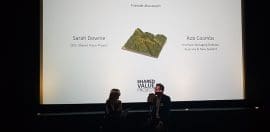While the last two years have been tough, shared value is going from strength to strength

17 November 2021 at 4:45 pm
This year’s top shared value organisations across the Asia Pacific region have been named
Coming off the back of two very challenging years, the 2021 Shared Value Awards set out to recognise people fighting for a different, more positive kind of change.
Hosted by the Shared Value Project Australia and New Zealand (SVP) on Tuesday, the awards celebrated organisations across the corporate, government, academic and NFP sectors using shared value.
Coined by Professor Michael E. Porter and Mark Kramer, co-founder in a 2011 Harvard Business Review article, the shared value model is designed to solve social and environmental problems profitably.
This year’s top prize of shared value organisation went to National Australia Bank for its work over the years to integrate shared value into the core of its business.
Projects have included setting up a Sustainability Council, an initiative bringing senior business leaders to drive action on climate change and housing affordability, its NAB Assist program, and Clean Energy Finance (CEF) programs.
To date, the bank has secured 120 CEF, is a founding signatory to the United Nations’ Collective Commitment to Climate Action and the only Australian bank to sign up, and has pledged to achieve net zero portfolio emissions by 2050.
Sasha Courville, the general manager of sustainability at NAB, told Pro Bono News that receiving this award was reflective of the company’s shared value journey over the past few years.
She said that the smaller shared value initiatives the company had engaged in over the years had built up to where it was now – shared value integrated across the entire company.
“Last year we launched a new group strategy for NAB, and for the first time, sustainability was embedded as a core component in our long-term pillar of strategic ambition,” Courville said.
“A key objective within that was driving commercial responses to society’s biggest challenges. It’s really been this evolution of work to move from pockets of excellence to embedding shared value into the core of our strategy.”
Steve Spurr, the director of SVP, said he was heartened by the drive to continue pushing for social change, even in trying times.
“Through the pandemic and the Black Summer bushfires that we’ve had in the last two years, you sometimes think that maybe people will be distracted and things will disturb the momentum towards purpose led work and people really putting the effort into shared value strategies,” Spurr told Pro Bono News.
“And I actually think the opposite has kind of happened, which is really heartening.”
Award winners reach higher calibre than ever before
While the shared value space has traditionally been dominated by financial services, this year saw a broader range of industries throwing their hat into the ring.
Spurr said that the high and broad calibre of entrants and award winners was an exciting development of this year’s awards compared to other years.
“Of course we had entrants from our traditional space, the financial services, where a lot of shared value work started. But this year we had telecommunications, fast moving consumer goods, logistics, postal services, and legal services,” he said.
“The vast range of organisations coming to deliver on shared value really means that we’re solving those social environmental problems profitably across more and more sectors of business.”
Courville added that one of the biggest takeaways she had of the shared value movement in recent times was the increasing sophistication of shared value projects and the collaboration that was happening between sectors to make it happen.
“We’ve seen an increasing sophistication in the participation of other key stakeholders, including governments and civil society, recognising that everyone has a role to play in delivering solutions to societal challenges,” she said.
“There was always a hope that it wouldn’t just be individual companies doing great share value things, but we would be able to work together to deliver some fantastic outcomes, and we’re really seeing that now.”
‘We’re at a critical juncture’
Coureville said that as sustainability issues were becoming recognised as critical for businesses to address, the future focus of shared value and other impact measurement vehicles should be on the how, rather than the what.
“It won’t so much be about what companies are doing, but how well they are doing it and how they are doing it. How exactly are businesses competing to deliver the best outcomes for customers and the planet?” she said.







